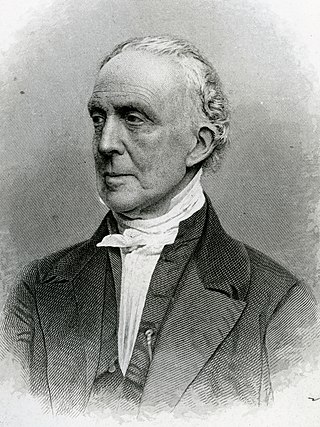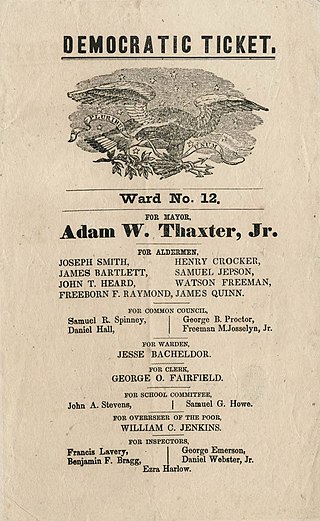
Josiah Quincy III was an American educator and political figure. He was a member of the U.S. House of Representatives (1805–1813), mayor of Boston (1823–1828), and President of Harvard University (1829–1845). The historic Quincy Market in downtown Boston is named in his honor. A panel of 69 scholars in 1993 ranked him among the ten best mayors in American history.

Alexander Hamilton Rice was an American politician and businessman from Massachusetts. He served as Mayor of Boston from 1856 to 1857, a U.S. Congressman during the American Civil War, and as the 30th Governor of Massachusetts from 1876–1878. He was part owner and president of Rice-Kendall, one of the nation's largest paper products distributors.
The Boston mayoral election of 1907 was held on Tuesday, December 10, and saw Republican nominee George A. Hibbard defeat Democratic incumbent John F. Fitzgerald as well as Independence League nominee John A. Coulthurst. Ahead of the general election, primary elections for each party had taken place on Thursday, November 14, 1907.
The Boston mayoral election of 1854 saw the reelection of incumbent mayor Jerome V. C. Smith. It was held on December 11, 1854.
The Boston mayoral election of 1855 saw the election of Alexander H. Rice. It was held on December 10, 1855.
The Boston mayoral election of 1857 saw the election of Frederic W. Lincoln Jr. It was held on December 14, 1857.
The Boston mayoral election of 1858 saw the reelection of Frederic W. Lincoln Jr. It was held on December 13, 1858.
The Boston mayoral election of 1859 saw the reelection of Frederic W. Lincoln Jr. to a third consecutive term. It was held on December 12, 1859.
The Boston mayoral election of 1860 saw the election of Democratic Party nominee Joseph Wightman. This was the first Boston mayoral election won by a Democratic Party nominee. It was held on December 10, 1860.
The Boston mayoral election of 1861 took place on Monday, December 9, 1861, and saw the reelection of Joseph Wightman.
The 1868 Boston mayoral election was held on December 8, 1868 and saw Frederic W. Lincoln Jr. be returned to the mayoralty for a fourth non-consecutive term, unseating incumbent mayor Joseph Wightman.
The 1863 Boston mayoral election was held on December 14, 1863 and saw Frederic W. Lincoln Jr. reelected to a fifth overall term.
The 1864 Boston mayoral election was held on December 12, 1864 and saw Frederic W. Lincoln Jr. reelected to a sixth overall term.
The Boston mayoral election of 1869 saw the reelection of Nathaniel B. Shurtleff to a third consecutive term.

The 1851 Boston mayoral election saw the election of Benjamin Seaver, a former president of the Boston Common Council, as mayor of Boston. The election took three votes, as no candidate secured the needed majority in the first two attempts. In the third attempt, Seaver won the required majority by the margin of a single vote. Incumbent Whig mayor John P. Bigelow was not a nominee for reelection.
The 1848 Boston mayoral election saw the election of Whig Party nominee John P. Bigelow. It was held on December 11, 1848. Incumbent Whig mayor Josiah Quincy Jr. was not a nominee for reelection.
The December 1845 Boston mayoral election saw the election of Whig Party nominee Josiah Quincy Jr. It was held on December 8, 1845.
The 1842 Boston mayoral election saw the election of Whig Party nominee Martin Brimmer. It was held on December 12, 1842. Whig Party incumbent Jonathan Chapman was not a nominee for reelection.
The 1836 Boston mayoral election saw the election of Whig Party nominee Samuel Atkins Eliot. It was held on December 12, 1836. Incumbent Samuel T. Armstrong was not a nominee for reelection.
The 1831 Boston mayoral election saw the election of Charles Wells. The first vote, held on December 12, 1831, did not result in any candidate receiving the required majority of the vote, resulting in a second vote on December 22, 1831, which Wells won.





